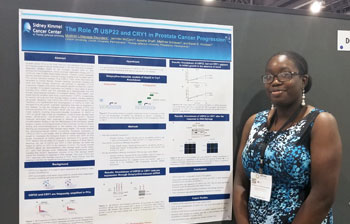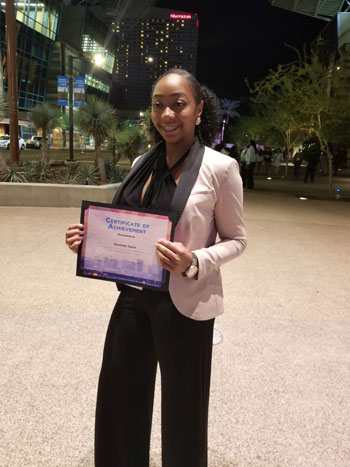
Lincoln University students, faculty, and staff are eager to learn about your research, scholarship, and creative activities and what you have discovered through your efforts. There are numerous venues at Lincoln University that make this exchange of information possible. Your professors, department, this website, and social media are good resources to learn about important dates, times, and places regarding these dissemination opportunities, as well as requirements to participate. Some key opportunities are listed below.
LUSRS (the University-Wide Showcase for Undergraduate Research and Creative Activities)

The annual Spring Scholars Symposium offers students from all majors a chance to showcase their works via poster, oral, panel presentations and creative performances. It also provides a venue for students to observe their peers presenting and win awards. Top presenters are recognized during the awards ceremony at the end of the showcase. Categories cover humanities, social sciences, arts, and STEM (science, technology, engineering, and mathematics) fields. LUSRS is organized and hosted by the University’s Center for Undergraduate Research.
PUBLICATION OPPORTUNITIES AT Lincoln University (Coming Soon)
What Kinds of Presentations Are Made at Meetings?
Oral presentations at a symposium allows students to showcase excellent public-speaking skills which can be enhanced through skillful creation and use of visual aids due to the complex nature of research topics. Audiences are typically smaller, but oral presentations allow increased interaction with the audience, such as through Q-and-A exchanges. Excellent oral presentations contribute to the student’s perceived effectiveness as a researcher. In fact, interviews for research-based jobs often involve an oral presentation.
Poster sessions are perhaps the most versatile dissemination method. They allow for opportunities to foster discussion, exchange ideas, and network with other researchers. Good posters can almost “present themselves” without your presence; when you are present, they can serve as effective visual aids for an informal speaking presentation.
Want to learn more? Submit a query to your favorite search engine to find “ten simple rules for” good poster or oral presentations. A multitude of excellent sources of information can be found online.
Meetings for Undergraduates
Our student researchers frequently submit abstracts and receive invitations to share research results beyond Lincoln University. They travel to present at regional, national, and even international meetings in their discipline. For some, these venues offer their first experience to make and deliver a research presentation, though most choose to start at LUSRS or college-level dissemination events.
Meetings that are geared toward undergraduates are also great places for a first presentation on research, scholarship, and creative activities. National meetings aimed at undergraduates frequently offer attractive and unique benefits, such as graduate-school recruiting fairs and special breakout sessions with information of interest to students. The professionals, scholars, and students you meet can also make great additions to your growing professional network.
Meetings specifically for undergraduates include, but are not limited to, the following:
 A popular way to disseminate your research is to publish your findings in a scholarly journal. Instead of in-person presentations, this is a writing-based method of dissemination that has potential for the widest-reaching impact. It involves a rigorous and formal peer-review evaluation of your methods and findings by an objective third party. This method also offers unprecedented accessibility to and permanence of your work—journal, and articles are increasingly available online or as downloadable files.
A popular way to disseminate your research is to publish your findings in a scholarly journal. Instead of in-person presentations, this is a writing-based method of dissemination that has potential for the widest-reaching impact. It involves a rigorous and formal peer-review evaluation of your methods and findings by an objective third party. This method also offers unprecedented accessibility to and permanence of your work—journal, and articles are increasingly available online or as downloadable files.
Publishing your work in written form offers a broad audience made up of individuals with interests and knowledge inherent to the publication your work appears in. Your perceived impact as a researcher is predominantly measured by how other researchers refer to, and rely on, the articles you produce using this dissemination method. Students can locate external publishing opportunities by clicking on the following link: https://www.cur.org/resources/students/undergraduate_journals/.